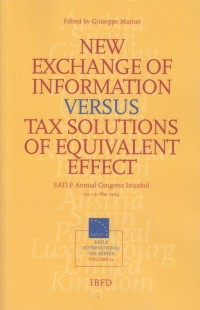
Book
New Exchange of Information versus Tax Solutions of Equivalent Effect
Thanks to technological applications such as the Internet, social networking, tablets, smartphones and credit cards, more information about us is being collected and stored than ever before. This collecting of information, or so-called “datafication”, takes all aspects of life and turns them into data. The result is “big data”: large pools of data are captured, communicated, aggregated, stored and analysed. Big data is both evidence of the increasing intrusion into our daily lives as well as a tool to create transparency, competition and growth. If information is power, then big data is the accumulation of power, especially in taxation.rn rnThis book provides a comprehensive survey of the classic methods of exchanging tax information as provided under the OECD Model Tax Convention, tax information exchange agreements, mutual administrative assistance in tax matters and the adoption of Council Directive 2011/16/EU on administrative cooperation and anti-money laundering legislation. Particular attention is given to the rapid international consensus on automatic exchange of information (AEOI) as a direct consequence of the US Foreign Account Tax Compliance Act (FATCA) policy. The book highlights the alternative unilateral tax solutions of equivalent effect, such as the “Rubik agreements” of Switzerland, offshore voluntary disclosure programmes, whistle-blower programmes and offshore tax amnesties, which are used in the meantime until the transparency of AEOI becomes effective – if ever.rn rnThe challenging aspect of this research is to imagine the consequences of current tax transparency in the future. Two issues are at stake. The first is linked to the relation between unilateralism and cooperation, since cooperation means sharing the revenue related to “datafication” with other members of the international community, while any unilateral initiative brings money straight to the domestic revenue. The second concerns the other face of transparency – privacy. Supranational rules governing big data should be democratically developed, otherwise there is the risk of going beyond the proportionality principle, with no sustainable protection rules for taxpayers.
Detail Information
| Call Number |
09 NEW giu
|
|---|---|
| Publisher | IBFD : ., 2015 |
| Collation |
xxviii, 626 p, 23 cm
|
| Language |
English
|
| Classification |
09 NEW giu
|
| ISBN/ISSN |
978-90-8722-348-9
|
| Edition |
-
|
| Subject(s) |






